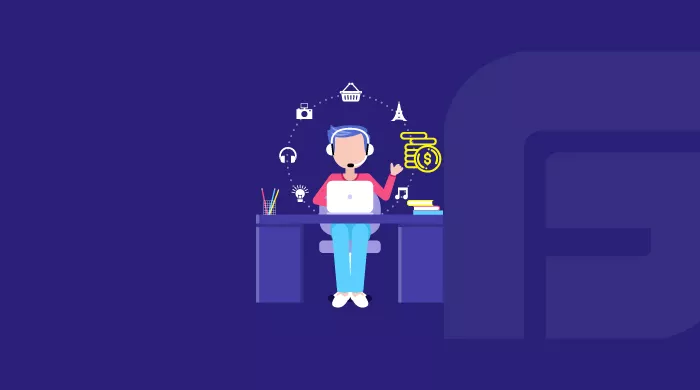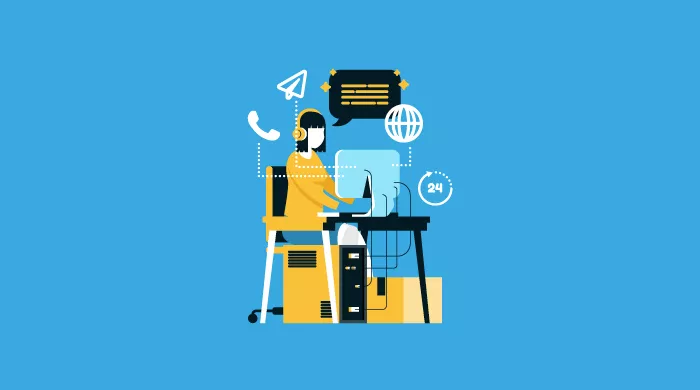Chatbots are enabling businesses to achieve their most significant goal - ensuring that the customers are delighted and pleased at all times, and to gain consistent growth. The use of chatbots-enabled help desk software to provide 24/7 customer support is growing as the new approach.
As we all know, during the outbreak of the Covid-19 pandemic, companies were facing challenges in delivering timely services to their customers because of remote working and staff shortage issues. In such an unforeseen situation, organizations that rapidly adopted conversational AI-based Chatbots to increase self-service and enhance customer experience scaled and sustained well compared to those that did not..
Chatbots have drastically transformed the way businesses deal with their customer support or customer service practices.. Also, the modes through which customers communicate with the businesses have undergone a dramatic transformation over the past two decades. From emails, telephone calls, live chat to chatbots, to conversational, multi-lingual, AI-based Chatbots, customers have come a long way when it comes to communicating with the brands.
Is this transformation due to the changing expectations of the customers?
Undeniably, customers expect high-quality support round the clock. If you delay responding to your customers, they move to your competitor. It is as simple as that.
As per Brittany Hodak (keynote speaker and award winning business leader) - there are three Ps of high-quality customer service - professionalism, patience, and people-first attitude. Let’s have a glimpse of these 3 important qualities of customer support as given below -
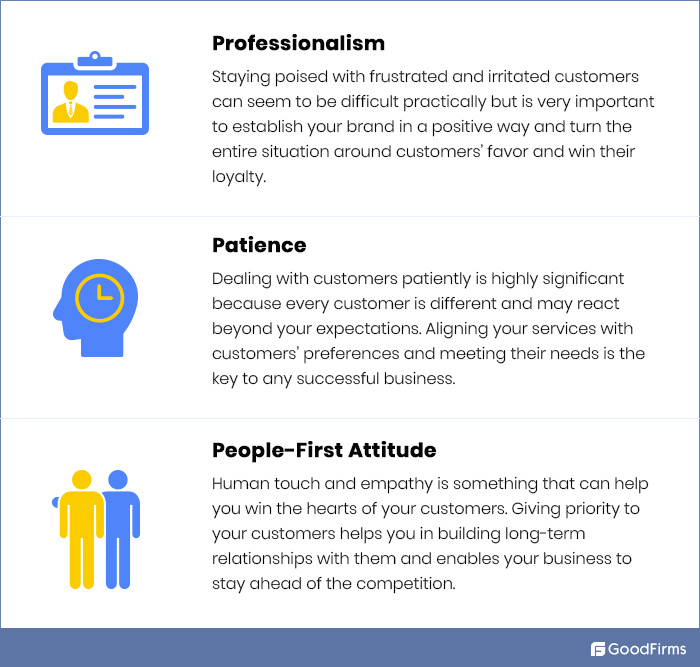
For many businesses, chatbots have been proven to be beneficial in cutting down operational costs and attending to their customers 24/7, 365 days a year, even during the Covid-19 outbreak. This strongly has inspired many companies to integrate chatbots into their business websites and social media messaging services, to satisfy their customers, stay competitive, and generate more revenue.
So, is the dominance of chatbots in customer service going to end in the future? Or will this sustain in better forms to deliver exceptional customer service? Read further to gain more insight on this.
A Basic Overview of Chatbots
Chatbots (Chat + Robots) is a computerized program used to create human-like text and voice conversations based on predefined rules, triggers, and events. The chatbots can be integrated into different platforms like websites, messaging applications, emails, where customers approach to solve their queries..
A chatbot is programmed to communicate with a human user in English or any other language. Based on certain inputs, the Chatbots provide information to the customers, resolve their issues, and help them complete their tasks without any human intervention. For example, a chatbot can help a banking customer to acquire information about the balance in their savings account or register a complaint against a stolen credit card.
Unlike humans, chatbots don't react based on their moods. The reaction of the chatbot to a query is consistent. The chatbots also don't get frustrated with annoying customers, and thus applying them into your messaging services improves your relationships with your clients, and at the same time, frees up your human resources to perform more productive and revenue-generating tasks.
Types of Chatbots
There are three types of chatbots - Rule-Based Chatbots, AI-Powered Chatbots and Hybrid Chatbots.
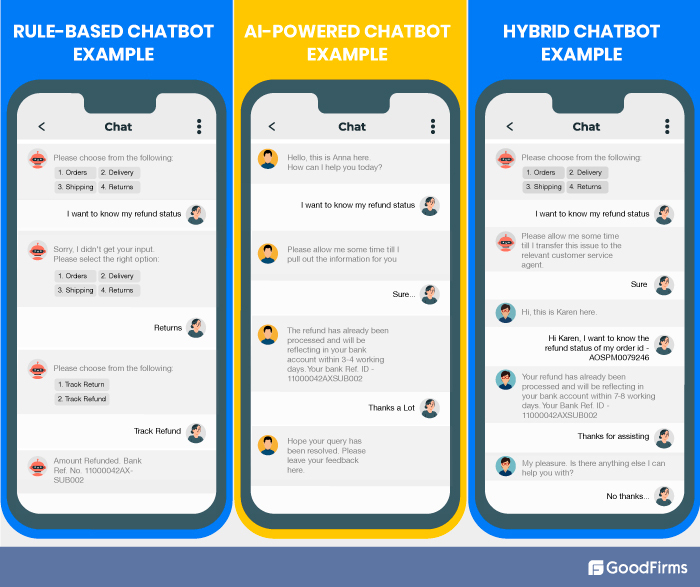
Rule-Based Chatbots are designed and developed to answer questions based on some predefined rules they have been fed with. This type of chatbots are generally quick to train, can integrate with other systems with the organization and have proven to be cheaper than deploying AI-based and hybrid chatbots. But, rule-based chatbots cannot answer questions outside of their defined rules and they also don’t learn from their past interactions. Rule-based chatbots can help only if you have fixed anticipated responses to the defined questions your customers might ask.
AI-Based Chatbots can handle any type of query because they are programmed to learn from past interactions with the customers. Besides that, AI-Powered bots are integrated with APIs that provide required resources that make them ready to provide the users with the right information and solutions. The chatbots powered by artificial intelligence are capable of making real-time decisions, delivering quick customer support, and generating analytical reports. AI chatbots learn from every conversation done with the clients and get smarter each day but still, there are chances that the conversations with this type of chatbot can reach a dead end leaving the customers dissatisfied as it lacks human agent monitoring and redirection facility.
Hybrid Chatbots include applications that allow human intervention when required in case of a critical problem which automated bots are unable to resolve. In certain situations, the customers require speaking to human service agents for a satisfactory resolution or many times the rule-based chatbots are likely to take the conversation to the dead end. In that case, the customers should be given the facility to speak to a human service agent to get their query resolved. Hybrid chatbot is a perfect combination of rule-based and AI bots making it a balanced and perfect tool for the businesses to understand and converse with their customers.
Which Type of Chatbot Would be the Best for Your Business?
To answer this question, you need to know what your chatbots will be used for. If your business requires collecting specific information from your customers, rule-based chatbots would suffice your needs. In case your business needs dealing with the open-ended queries, AI-based chatbots can work for you. But, if your business needs providing your customers with high-end personalized solutions, hybrid chatbots would be the right choice for you.
Below-mentioned uses of chatbots in customer service can help you decide which type of chatbot you would like to deploy for your business.
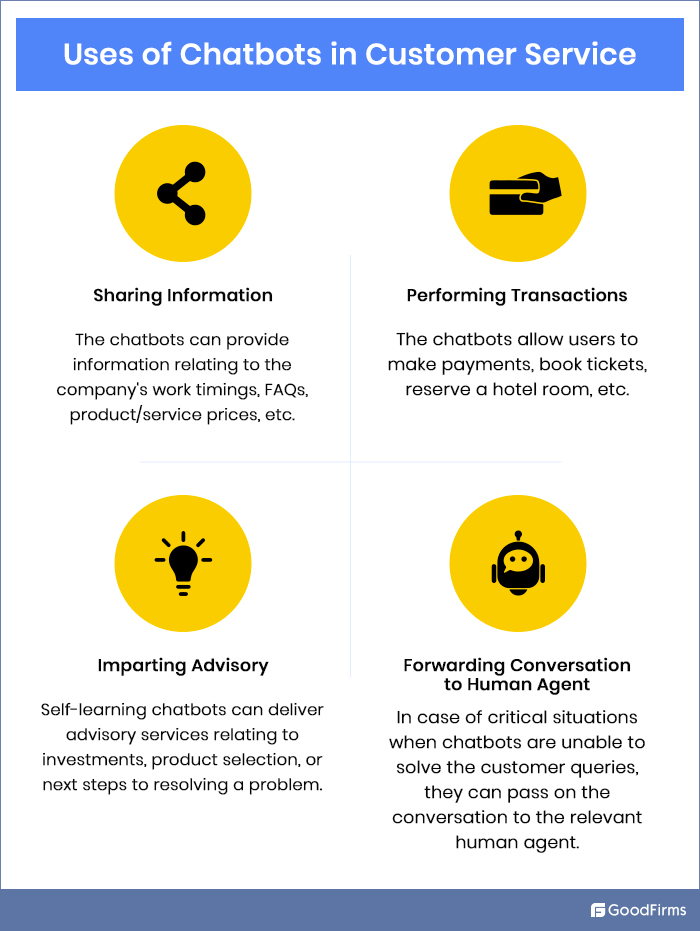
The Technology Behind AI-Based Chatbots
Chatbots are evolving very fast, and so are the technologies behind their development. Developing chatbots requires an in-depth understanding of technologies like Artificial Intelligence (AI), Natural Language Processing (NLP), and Machine Learning(ML), along with UI designing and back-end development skills.
AI platforms are available that help create and deploy chatbots to websites and messaging applications. For example, BotStar allows users to design, build, and train chatbots for messenger and websites. WotNot is considered one of the best no-code chatbot platforms that allow developing AI bots easily without coding skills. Also, you can browse through the complete list of the best Artificial Intelligence solutions that allow chatbot development with ease.
Chatbots can be deployed to multiple platforms like Facebook/Instagram Messenger, Slack, Skype, business website, etc. The choice of a chatbot deployment platform depends on your business needs, budget, and target audience.
Before you proceed with the development and deployment of the chatbots, below-mentioned are some best practices to be followed to make this endeavor a success -
Best Practices to Implement Chatbots
Setup Goals
Setting up goals you want your chatbots to achieve is vital before you start getting them designed, built, and implemented. You need to brainstorm about: Why do you need chatbots, and what do you want your chatbots to do? You need to determine the role of your chatbots in your customer service department.
Know Your Audience
Understanding your audience is extremely important for the success of any chatbot. You need to be aware of what kind of questions your audience might ask relating to your business. Previously recorded live chat interactions might help you prepare your chatbots to answer all kinds of questions your customers might have.
Select the Right Deployment Platform
If you are developing voice-based chatbots, you need to ensure that it works best on different operating systems and devices your target audience is likely to use. And if you are building text-based chatbots, you need to ensure that you select the appropriate ones among Facebook/Instagram messengers, Whatsapp, live chat applications, etc.
Design Smart Conversation Flow
Humans can ask a single question in multiple ways. Thus it becomes important to feed a proper conversation flow and train the chatbot accordingly to enable the system to provide correct responses to the customers. In this context, it requires designing a smart conversation flow that allows your bot to provide scalable answers and keep learning from those interactions.
Test Rigorously
Before implementing the Chatbots, you need to test them rigorously to reach the maximum level of accuracy. Timely reviewing is required to ensure that the chatbots learn from their interactions with the customers and improve their conversational skills. It is also essential to check how users interact with the chatbots to achieve high-level customer satisfaction.
So, how exactly can chatbots help in following a customer-centric approach? Let's look at the major capabilities of chatbots that enable you to optimize your customer service process by delivering consistent, user-friendly, and multichannel customer support.
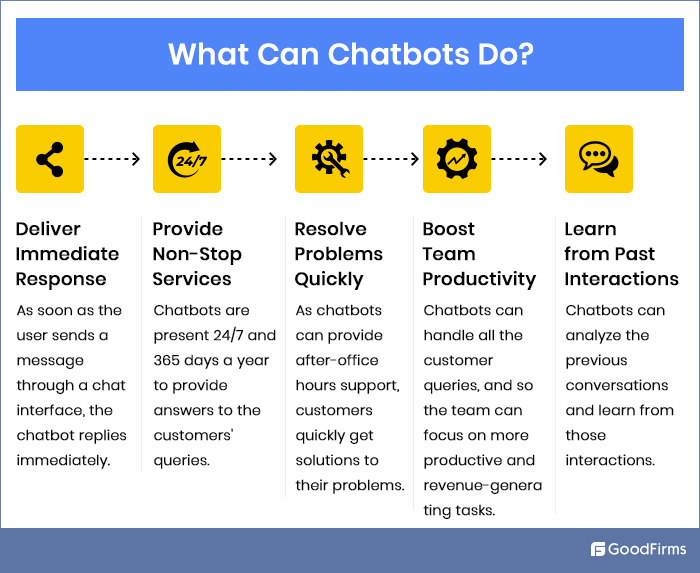
Precisely, chatbots empower you to -
- Provide multilingual support for your globally spread business
- Deliver services across multiple platforms - website, social media, in-app, etc.
- Make your support team available 24/7
- Reduce customer support costs
- Implement new ways to scale your customer support process
The Extraordinary Capabilities of Today’s AI-Based Conversational Chatbots
Context Management - Bots can now learn from past user interactions and retain important details, including customer preferences, making it simple to conduct context-rich and personalized conversations.
Dialog Management - Bots are empowered enough to handle complex human interactions with twists and turns and dialog changes that include understanding complex sentences with multiple entities.
Multilingual Support - With advanced chatbots technology, the organizations can establish conversations with global audiences supporting different languages..
Omnichannel Presence - The modern chatbots of today allow companies to start the conversation with a human on one channel (Facebook) and end it on another (Whatsapp) without losing continuity or context.
Sentiment Analysis - AI-based chatbots can even understand the sentimental dialogs uttered by humans and respond accordingly.
How Do Chatbots Help in Handling the Toughest Customer Support Challenges?
Guiding Customers to Better Outcomes
Customers are generally unaware of where to find the information they require or confused. A human service agent can even get confused if the customer is unclear about their requirements. On the contrary, chatbots help by guiding customers through different questions and finding the right solutions for them. Additionally, chatbots allow customers to qualify for the answers they are seeking.
Communicating in Multiple Languages
Chatbots are highly useful when it comes to communicating with customers spread out all over the world. Hiring human agents who can speak different global languages can be an arduous and expensive task. Chatbots need to be programmed in the languages you need to converse in with your customers. This helps you target more customers by eliminating geographical barriers when it comes to effective communication resulting in improved business and revenue generation.
Mitigating Errors in Responses
Getting a different response from a client service agent every time a customer calls for the same problem is something that irritates them and drives them away from a business. Also, it happens that the customers need to explain the problem from the start if they are calling for a second time as they are speaking to a different customer support agent. That means there is no continuation in the conversation. Chatbots can help eliminate these types of situations as they can record every past interaction of the customers and thus can help in mitigating these problems by providing consistent and contextual information whenever a customer calls for assistance.
Round the Clock Availability
Remaining available for the customers at their convenient time is quite challenging for any business. Even if you hire a team of customer support agents that work in shifts, there are some situations where you fail to provide round-the-clock customer support. For instance, during the covid-19 pandemic, when stay-at-home mandates were imposed, it became impossible to provide 24/7 customer support. In that situation, chatbots helped companies to survive by enabling them to provide round-the-clock customer support and stay constantly engaged with their customers.
Tracking Data and Metrics
Chatbots ease the work of customer service departments by collecting and tracking data and metrics relating to the customer satisfaction level and help in making better decisions. Chatbots enable you to form a knowledge repository that helps in tracking appropriate data and metrics relating to the customer requirements, expectations, and complaints. This makes it simple to provide relevant information and personalized information to each customer.
Enabling Consistency in Conversations
Human customer support agents may at times react as per the mood or get impatient in difficult situations. Chatbots work based on certain rules and previous learnings. So, the responses provided by chatbots are consistent and precise. Providing contextual and relevant information to the customers in all situations is a challenge for most businesses these days due to remote working environments and staff shortages. In that case, chatbots play a significant role in providing seamless customer experiences.
Ability to Handle Multiple Customers at the Same Time
It doesn’t matter how many customer support agents you hire for your organization, they still have limitations in terms of handling the number of customers in a day. Moreover, each of your customer service representatives is capable of replying to one customer at a time. On the contrary, chatbots can deal with multiple customers at the same time and even complete different tasks parallely like collecting payments, generating support tickets, placing orders, registering a complaint, etc.
Generating Leads and Improving Conversions
The ultimate goal of any business is to generate maximum quality leads that get converted. As chatbots can help in conducting surveys, and collecting feedback from the customers, it becomes easy to analyze that data and plan better marketing strategies. These marketing strategies further can be implemented to generate quality leads and convert them.
Saving Time and Money
eCommerce companies work 24/7 and customers shop online at any time of the day. The customers shop any time of the day from eCommerce stores and expect round the clock services. Hiring customer support agents for providing 24/7 services can prove to be highly expensive. Moreover, chatbots are known for solving queries quickly and saving time. So, the time saved is money saved. As per Oracle survey, chatbots could save $174 Billion across Insurance, Financial Services, Sales, and Customer Service.
Delivering Personalized Services
Every customer is different and expects unique solutions to their problems. Failing to provide personalized information and services can alleviate frustrated customers leading to revenue loss. The AI-based chatbots have the potential to deliver personalized services based on the past conversations and integrated CRM applications that provide customers’ information about their pending orders, shipment delays, promotion codes applied, etc.
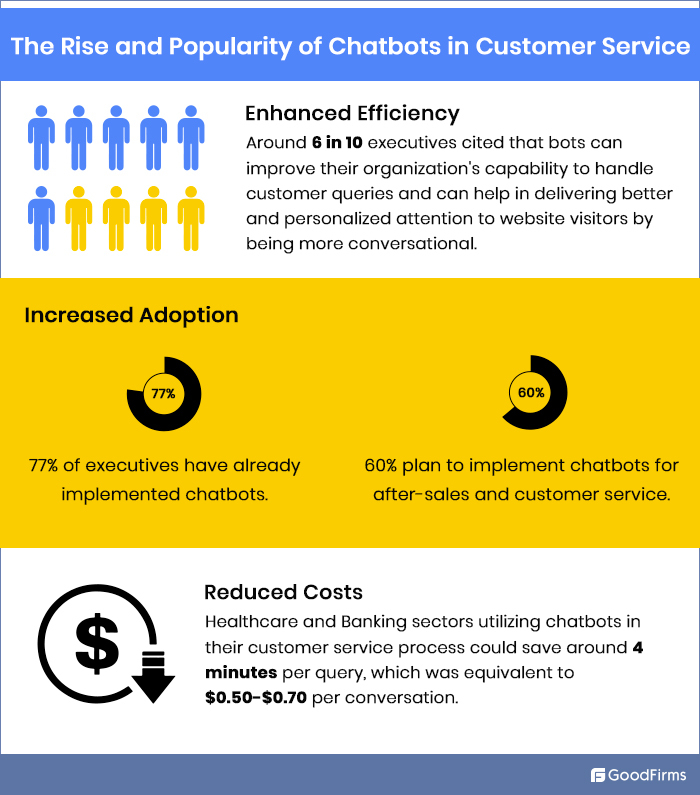 (Source: Accenture & Deloitte)
(Source: Accenture & Deloitte)
Why is it Significant to Implement Chatbot-Integrated Live Chat for Better Customer Service?
As per Zendesk Survey 2020, more than 60% of surveyed customers feel that resolving issues quickly is one of the most prominent factors of a good customer service experience. Also, around 40% of surveyed customers believe that support should be provided 24/7, i.e., on a real-time basis.
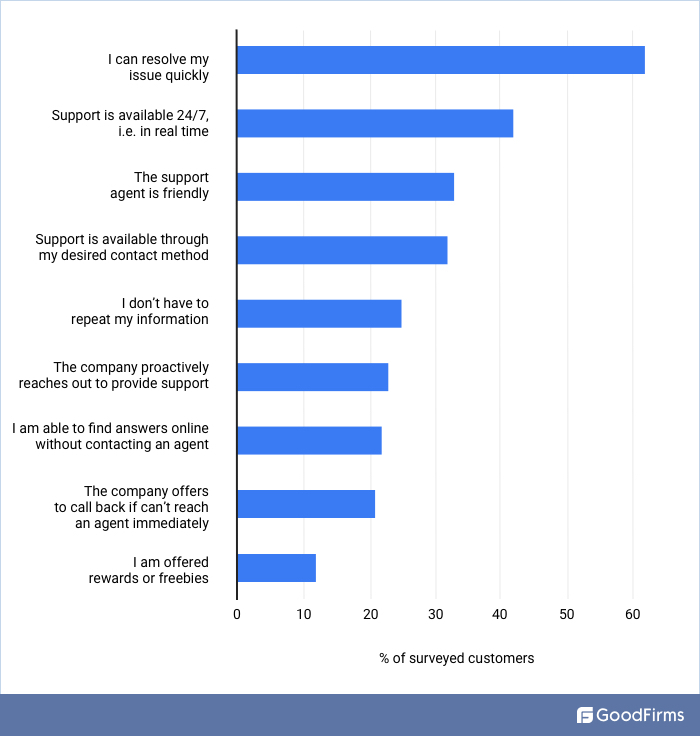
(Source: Zendesk Survey 2020)
Thus, the modern customers' expectations in terms of response patterns are very clear - they require quick answers to their queries at their convenient time. Delay in response or having them repeat their queries with different agents would drive them away from your business. Also, customers these days prefer handling their problems themselves. So they don't mind proceeding with self-service powered by AI-based chatbots, especially if it means acquiring speedy and efficient resolutions to their issues.
Streamlines Customer Onboarding Experience
Customer onboarding is a key process for any brand as it is the first point where the new users or customers get familiar and comfortable with your product. Efficient onboarding is directly connected to customer retention. To get the users to use your product by continuous reminders, to create a pattern, and to make your offering indispensable, there has to be a system that does this constantly. Here is where Chatbots can be made better use. Chatbots can educate your customers and simplify their onboarding process without consuming the valuable time of your human resources, which can be used in many other productive and strategic tasks.
Increases Customer Engagement
Chatbot, also known as conversational AI, is known to deliver consistently and to the point answers to the users. Moreover, chatbots are more data-driven than humans, and that makes them more interactive and precise. Relevant and quick answers would obviously drive towards better customer engagement. That means the customers stay longer with your business and help you generate more revenue.
Reduces Customer Service Costs
Chatbots can automate communication between businesses and customers. This automation reduces hiring a huge team of customer service representatives working in different shifts. Moreover, during holidays and odd days, you don't have to pay extra incentives to your employees to deliver services to your customers. Chatbots work 24/7 and 365 days a year non-stop without any holiday breaks, thus leading to saving costs in terms of salary, training, and infrastructure.
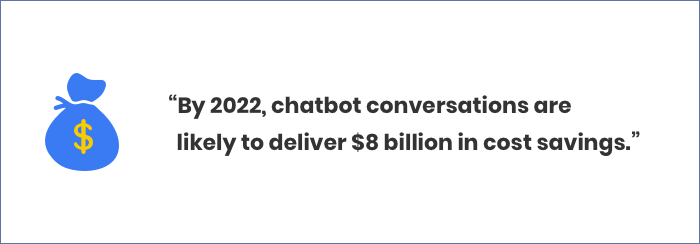
(Source: Juniper Research)
Enhances Visibility
Integrating chatbots with your live chat applications is one of the easiest ways to monitor and analyze consumer behaviors. This data captured on a real-time basis can help you improvise your services and expand your reach. Moreover, chatbots can also be used to collect customer feedback which can further be analyzed to improve products and gain a high level of customer satisfaction.
Expands Global Reach
Since chatbots are capable of providing multilingual services, it becomes easy for you to expand your business's global reach, target customers worldwide, and eliminate geographical barriers. NLP (Natural Language Processing) empowered chatbots being used today can automatically identify the customers' geographical location through IP addresses and communicate with them in the language they are comfortable with.
Encourages Scalability in Support
Scaling customer support strategies should be the priority of any customer-centric organization. The chatbots can manage conversations efficiently even during peak hours, the seasonal surge in sales, and similar situations. You don't need to hire more support experts and spend time and money on providing training to them. Chatbots can help you achieve ultimate scalability in support without making huge investments.
Establishes Trouble-Free Customer Journey
For any business, it is difficult to lose a prospect halfway through a sales funnel. Providing the best customer service is not only significant to engage present customers but also for mitigating the chances of losing valuable prospects contributing to the growth of your business. Your prospects might be having many queries during their journey with your business, and if not answered at the right time, they can lose interest in your business. Chatbots can effectively answer the queries of your prospects at every stage of their journey and enable successful deal closures.
Balances Robotic Effect With Human Impact
The right combination of technology and a human touch can help your business deliver exceptional customer support. Integration of chatbot with live chat software means that you are allowing your customers to make choices and self-serve and connect with the customer support team only if required. Using conversational AI within your help desk systems can help you deliver prompt services even during staff shortages. When only critical problems come to human service agents and basic issues are being solved by chatbots, your business is likely to become exponentially efficient in delivering improved service..
Precisely, the companies that still depend on phone calls and email for delivering customer service are considered obsolete in this digitally transformed business world at present. Chatbots can make that possible by delivering more enjoyable, safer, and productive customer experiences.
Without any doubt, chatbots are proving to be beneficial to both customers and the businesses.
Benefits of Chatbots for Businesses and Customers

What does the future Hold for chatbots' role in customer service?
With the improved capability of getting integrated with different messaging platforms, chatbots are getting more mature and intelligent over time. With advancements in technology, conversational AI would handle more complex queries and help businesses grow by leaps and bounds.
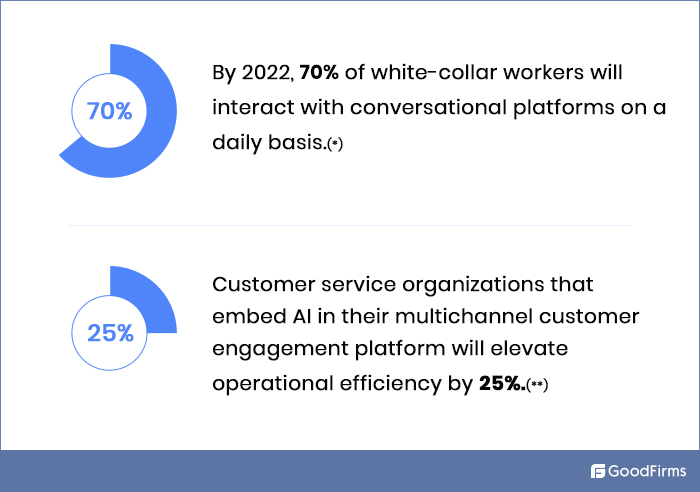
(Source: Gartner(*) & Gartner (**))
The chatbots are aiming towards providing more human-like conversations; they are going to eventually become the driving force behind business communications and help companies to cope up with the consistently growing customer demands.
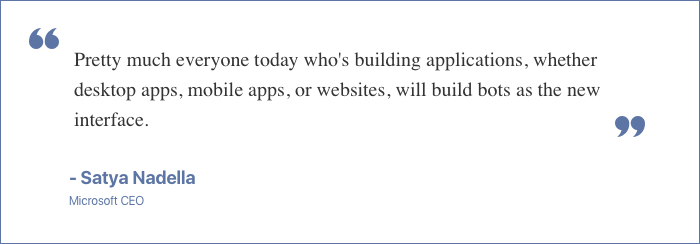
Thus, the future is bright for chatbots, and it is the right time for the companies to integrate chatbots in live chat and help desk applications to deliver better experiences to their customers and gain a competitive advantage.
If you are looking forward to modernizing and digitally transforming your customer support department, consider browsing through this complete list of AI-powered help desk solutions and make a smart purchasing decision.





